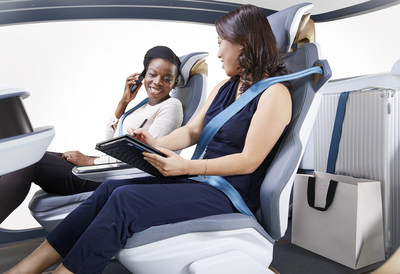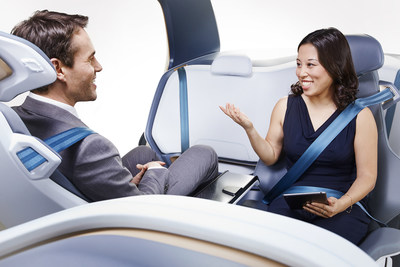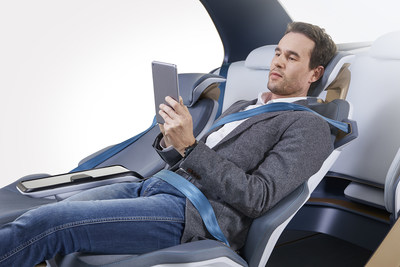Adient’s AI18 concept vehicle showcases the future of automotive seating
Global seat supplier unveils flexible interior configuration for urban autonomous vehicles
DETROIT, Jan. 15, 2018 /PRNewswire/ — Adient (NYSE: ADNT), the largest global automotive seating supplier, will demonstrate how new forms of mobility affect vehicle interiors with its AI18 concept vehicle at the 2018 North American International Auto Show (NAIAS).

The innovative new concept was developed based on the findings of Adient’s proprietary studies of automotive customers’ seating needs in 2030 and beyond. The company focused in particular on new mobility alternatives such as ride sharing in urban environments.
“In the future, urban vehicles need to offer transforming seating solutions that can be easily modified to suit almost any situation throughout a typical day. Shared economy mobility will become the common way of life in big cities,” said Richard Chung, vice president of innovation at Adient.
The AI18 concept’s seating system is highly flexible yet compact for use in urban vehicles and its numerous lightweight construction options make it ideal for electric mobility vehicles. The products shown in the concept can be assembled individually so manufacturers can use them in a wide range of vehicles for urban use — from micro-cars and mini-vans to mini-buses.
Flexibility for many uses
Adient demonstrates just how flexible level 3 and 4 autonomous vehicle seating can be with the AI18’s usage scenarios. These provide passengers with the appropriate seating configurations, space and convenience for comfortable and safe mobility in each situation:
- Lounge mode provides a high level of comfort and relaxation. The front seats have an “anthropometric” pivot that ensures the seat can recline and still provide support if the angle is beyond the normal range. The concept’s head support, integrated arm rests and special leg support are synchronized to move seamlessly with an occupant’s body. To provide optimal safety, the seatbelts in the front row are integrated into the seat structure — not in the B-column of the vehicle as is the norm today. Adient’s improved design ensures the belt withstands the modified loads and movements required of new seating positions in autonomous vehicles.
- In communication mode, the vehicle becomes a mobile meeting space. The front passenger may turn 180 degrees so the driver and passenger can talk facing each other. To enable this, Adient is developing a new form of kinematics for the seating platform that lifts slightly so it can turn in a compact interior space. For the first time, this movement works when a person is already seated. All seating functions and vehicle settings are controlled via an operating panel integrated into the driver’s seat so the seat increasingly becomes the “command center,” regardless of the seating position of the passengers.
- In cargo mode, the AI18 reveals its convenient space options. The two seats in the first row provide a familiar level of comfort while the seat cushion in the back row retracts into the cargo area using an electric mechanism similar to a drawer. This provides additional space behind the front seats for easier access during short trips.
- The AI18’s family mode is closest to the interior of a conventional vehicle. The front two seats face the direction of travel; the rear seats are fully deployed. The new and particularly light headrests are synchronized with the seats and extend alongside them from the back bench seat. As a result of this innovative design, the headrests contain significantly fewer components and weigh around 20 percent less than comparable headrests on the market.
- The baby plus mode addresses the needs of parents with babies and small children. Seats turn 180 degrees opposite the driving direction so parents can interact with their children while traveling safely. The integrated ISOFIX restraint system securely connects the child’s seat to the vehicle. In addition, one of the rear seats can be extended so both parents can turn toward their children during a trip.
Smart solutions offer more safety, comfort and simple operation
Adient has integrated numerous “smart” solutions into the AI18. For example, seat-setting preferences can be stored in an app and restored automatically when getting into the car. Consoles integrated into the driver’s seat provide additional settings using gesture control.
Invisible to occupants, the AI18’s vehicle seats hide sensors that make the seats into intelligent comfort assistants. For example, they can assess body position and pressure points to optimize comfort in each seating situation even on longer trips. Meanwhile, integrated health monitoring measures occupants’ breathing and pulse rate to provide feedback on their physical condition, enabling time-saving tele-health services while traveling.
“Society is becoming more focused on how to convert idle time, such as time traveling in a vehicle, into more meaningful, valuable time. It won’t be just about doing something productive in the vehicle but also being able to feel comfortable and relaxed,” Chung said. “Because not every user requires the same range of comfort, this especially enables providers of ride-sharing services to customize their offerings in the form of modules. We call this trend “luxury on demand” and provide it in the AI18.”
Adient will present all of the AI18’s innovative usage scenarios at its NAIAS exhibit, which is open to the media and invited guests in Cobo Center’s Room 310B Jan. 15-18.
Adient – which became an independent company in 2016 after a successful spinoff from Johnson Controls – is a NAIAS event sponsor and exhibitor. NAIAS, one of the world’s premier automotive exhibitions, opens to the media and industry officials on Jan. 15. It will open to the public on Jan. 20. For more information, visit www.naias.com.
About Adient:
Adient is a global leader in automotive seating. With 85,000 employees operating 238 manufacturing/assembly plants in 34 countries worldwide, we produce and deliver automotive seating for all vehicle classes and all major OEMs. From complete seating systems to individual components, our expertise spans every step of the automotive seat making process. Our integrated, in-house skills allow us to take our products from research and design all the way to engineering and manufacturing – and into more than 25 million vehicles every year. For more information on Adient, please visit adient.com.


SOURCE Adient

